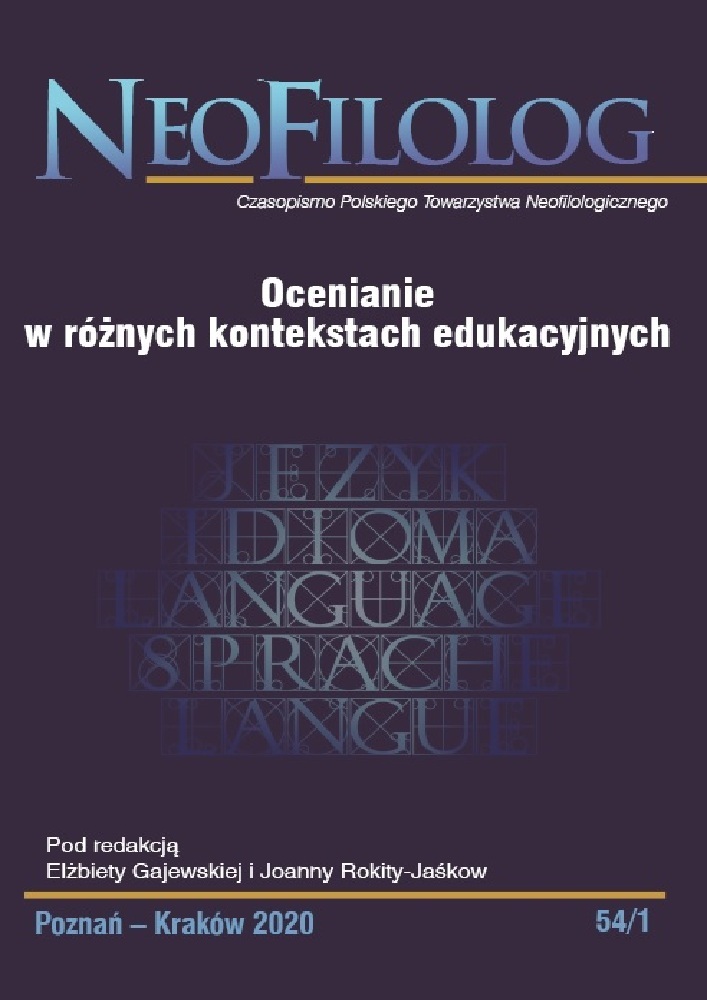Résumé
Open forms of work are now successfully used both in foreign language lessons and in academic education. Often, it may be difficult to assess the work of learners due to its specificity – that is, the summing and shaping of the assessment of the achievement of teaching objectives in school education and the effects of education in the didactics of the university. The question arises how to assess the work of learners during free work, while learners are working to attainment targets, working to weekly plans or doing project work. These issues will be subjected to theoretical analysis and discussed on the basis of my own empirical research in two areas of language teacher/foreign language education. On this basis conclusions will be formulated and research perspectives will be outlined with relation to school education and the academic education of foreign language teachers.
Références
Bauer R. (1998), Lernen an Stationen. Neue Möglichkeiten schülerbezogenen und handlungsorientierten Lernens. „Pädagogik“, nr 7–8, s. 25–27.
Bauer R. (2004), Offene Arbeitsformen. Nur schüleraktivierend, wenn schülergerecht. Beispiele aus der Praxis. „Pädagogik“, nr 1, s. 16–20.
Bohl T. (2004a), Prüfen und Bewerten im Offenen Unterricht. Weinheim-Basel: Beltz Verlag.
Bohl T. (2004b), Prüfen und Bewerten im offenen Unterricht. Bestandsaufnahme, Rahmenkonzeption und praktische Hinweise. „Pädagogik“, nr 12, s. 10–13.
Bohl T. (2009), Prüfen und Bewerten im Offenen Unterricht. 4. Auflage. Weinheim-Basel: Beltz Verlag.
Caspari D., Klippel F., Legutke M. K., Schramm K. (2016), Forschungsmethoden in der Fremdsprachendidaktik. Ein Handbuch. Tübingen: Narr Francke Attempto Verlag.
Epstein P. (2014), Z notatek obserwatora. Montessori w praktyce. Kraków: Oficyna Wydawnicza Impuls.
Grotjahn R. (1995), Empirische Forschungsmethoden: Überblick, (w:) Bausch K.-R. (red.), Handbuch Fremdsprachenunterricht. Tübingen und Basel: Francke Verlag, s. 457–461.
Grotjahn R., Kleppin, K. (2017), Prüfen, Testen, evaluieren. Fort- und Weiterbildungsreihe des Goethe-Instituts. München: Langenscheidt/Goethe Institut.
Hallet W., Königs F. G. (2010), Handbuch Fremdsprachendidaktik. Seelze-Velber: Kallmeyer in Verbindung mit Klett Friedrich Verlag.
Karpeta-Peć B. (2008), Otwarty, aktywny, samodzielny … Alternatywne formy pracy. Przewodnik dla nauczycieli języków obcych. Warszawa: Fraszka Edukacyjna.
Karpeta-Peć (2017), Indywidualizacja nauczania i uczenia się – otwarte formy pracy w gimnazjum oraz w kształceniu akademickim (action research), (w:) Werbińska D., Biedroń A. (red.), Różnice indywidualne w uczeniu się i nauczaniu języków obcych: konteksty edukacyjne, „Neofilolog”, nr 49/1, s. 95–114.
Kerschhofer-Puhalo N. (2001), Pädagogisch-didaktische Lernkategorien II: Organisationsformen von Lernen, (w:) Helbig G., Götze L., Henrici G., Krumm H. J. (red.), Deutsch als Fremdsprache. Ein internationales Handbuch. Berlin-New York: Walter de Gruyer, s. 761–776.
Kunter M., Trautwein U. (2018), Psychologie des Unterrichts. Padeborn: Verlag Ferdinand Schöningh.
Lehner M. (2009), Allgemeine Didaktik. Bern-Stuttgart-Wien: Haupt Verlag.
Łobocki M. (2000), Metody i techniki badań pedagogicznych. Kraków: Oficyna Wydawnicza Impuls.
Montessori M. (1949/1994), The absorbent mind. Oxford: Clio Press.
Niemierko B. (2002), Ocenianie szkolne bez tajemnic. Warszawa: Wydawnictwa Szkolne i Pedagogiczne.
Peschel F. (2010), Offener Unterricht. Idee, Realität, Perspektive und ein praxiserprobtes Konzept in der Evaluation. Teil I. Baltmannsweiler: Schneider Verlag Hohengehren.
Riemer C., Settinieri J. (2010), Empirische Forschungsmethoden in der Zweit- und Fremdsprachenerwerbsforschung, (w:) Krumm H.-J., Fandrych C., Hufeisen B., Riemer C. (red.), Deutsch als Fremd- und Zweitsprache. Ein internationales Handbuch. Handbücher zur Sprach- und Kommunikationswissenschaft. Berlin-New York: De Gruyter Verlag, s. 764–781.
Sehrbrock P. (1993), Freiarbeit in der Sekundarstufe I. Frankfurt/M: Cornelsen Scriptor.
Schart M., Legutke M. (2018), Lehrkompetenz und Unterrichtsgestaltung. München: Goethe Institut.
Stein B. (2003), Teoria i praktyka pedagogiki Marii Montessori w szkole podstawowej. Kielce: Jedność.
Vollmer H. J. (1995), Leistungsmessung: Überblick, (w:) Bausch K.-R., Christ H./ Krumm H.- J. (red.), Handbuch Fremdsprachenunterricht. Tübingen/Basel: Francke Verlag. s. 240-249.
Wilczyńska W., Michońska-Stadnik A. (2010), Metodologia badań w glottodydaktyce. Wprowadzenie. Kraków: Wydawnictwo Avalon.
Licence
© Beata Peć 2020

Ce travail est disponible sous licence Creative Commons Attribution - Pas de Modification 4.0 International.
Auteurs :
Les auteurs de textes acceptés pour publication dans la revue Neofilolog sont tenus de remplir, signer et renvoyer à l'adresse de la rédaction, un accord sur l'octroi d'une licence gratuite pour les œuvres, avec obligation d'accorder une sous-licence CC.
En vertu de cet accord, les auteurs des textes publiés dans la revue Neofilolog accordent à l'Université Adam Mickiewicz de Poznań une licence non exclusive et gratuite et permettent l'utilisation de la sous-licence Creative Commons Attribution-NoDerivatives 4.0 International (CC BY-ND 4.0).
Les auteurs se réservent le droit de disposer librement de l'œuvre.
Utilisateurs :
Les utilisateurs d'Internet intéressés ont le droit d'utiliser les œuvres publiées à partir de l'année 2017 sous réserve des conditions suivantes :
- reconnaissance de la qualité d'auteur - l'obligation de fournir des informations sur la qualité d'auteur, le titre, la source (liens vers l'œuvre originale, DOI) et la licence, ainsi que l'œuvre distribuée ;
- sans créer d'œuvres dérivées - l'œuvre doit être conservée dans sa forme originale, p. ex. les traductions ou les interprétations ne peuvent être distribuées sans le consentement de l'auteur.
Tous les textes publiés sont soumis au droit d'auteur.
Autres :
L'Université Adam Mickiewicz de Poznań se réserve le droit à la revue dans son ensemble (mise en page, forme graphique, titre, conception de la couverture, logo, etc.).
.

